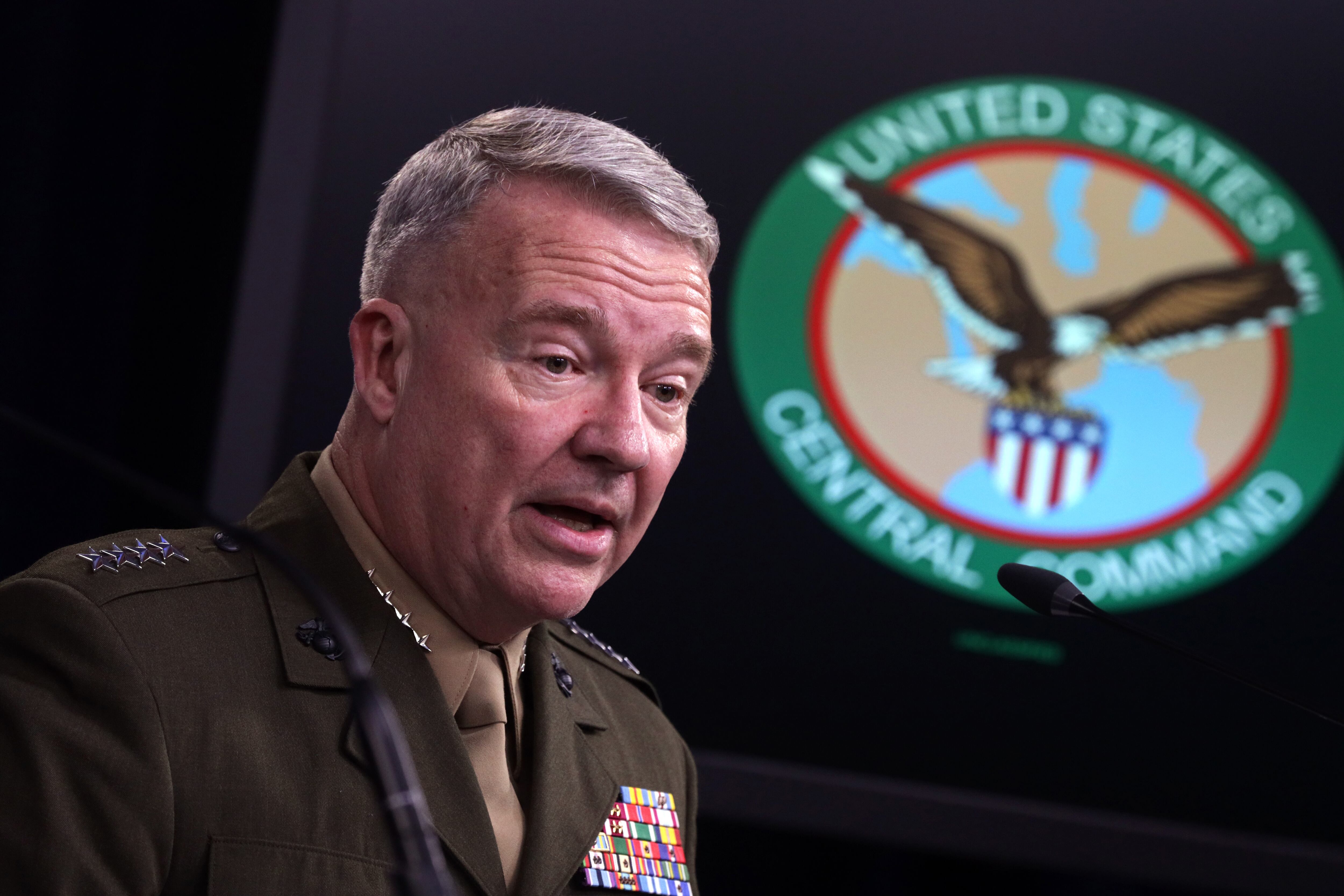WASHINGTON ― A rocket attack in Iraq that killed two American troops and one U.K. service member was “most likely” conducted by a Shia militia group, but the U.S. Defense Department is still investigating, according to the top commander of U.S. forces in the Middle East.
In congressional testimony Thursday, Gen. Kenneth “Frank” McKenzie said “the Iranian proxy group known as Kataib Hezbollah is the only group known to have conducted an indirect fire attack on this scale against the U.S. coalition forces in Iraq.”
A day after the attack, in which a dozen people were injured in a volley of 18 rockets that hit Iraq’s Camp Taji base, McKenzie said America’s “maximum pressure” campaign against Tehran ― including the presence of more than 10,000 U.S. troops in the Mideast and stiff economic sanctions ― has “reestablished a rough form of deterrence” without attributable state-on-state violence.
“We have seen they have stood their missiles down, I don’t think that’s an imminent threat,” McKenzie told the Senate Armed Services Committee. “What has not been changed is their continuing desire to operate through their proxies against us. And that is a far more difficult area to deter because they believe they can generate a measure of non-attribution with those attacks.”
This establishment of the international maritime security construct has ended Iran’s harassment of ships in the Strait of Hormuz, he added.
As of Thursday, McKenzie said U.S. Central Command headquarters is “working very hard” to attribute the Taji attack. He added later that the chain of command between Iran and its proxies “is not perfect. ... There’s a gap between intent and execution.”
“If you want to stop attacks in the grey zone, you have to convince the ultimate person that it’s not in their long-term interest to continue them,” he said.
Lawmakers wanted to know if the reported 10,000-plus COVID-19 coronavirus cases in Iran are making the Tehran less hostile to Washington and whether it is delaying reprisals against U.S. interests. McKenzie did not see that as likely.
“They are fractured now and they’re having difficulty dealing with the number of things, so it probably makes them ... more dangerous rather than less dangerous,” McKenzie said.
At the hearing, Republicans praised the U.S. airstrike on Jan. 3 that killed Iran’s most powerful military officer, Gen. Qassem Soleimani, and Abu Mahdi al-Muhandis, a leader of the Iranian-backed militias in Iraq, of which Kataib Hezbollah is a member.
In an exchange with Arkansas Republican Sen. Tom Cotton, McKenzie affirmed that Tehran was chastened by the strike. “They have never doubted our capability, they have often doubted our will, and I think that gave them something to think about,” McKenzie said.
But panel Democrats were openly skeptical the strike and the administration’s heavy troop deployments to the Mideast were achieving deterrence against Iranian proxy forces. SASC ranking member Sen. Jack Reed, D-R.I., said the administration’s exit from the Iran nuclear deal had also given Tehran a pretext to continue enriching uranium “and may in fact increase the likelihood of conflict.”
On Wednesday, as news broke about the Camp Taji attack, the U.S. House approved a bipartisan, Senate-passed measure Wednesday aimed at limiting President Donald Trump’s authority to launch military operations against Iran. Trump is expected to veto the measure, which he sees as tying his hands in dealing with Tehran and weakening the U.S. in the region.
At Thursday’s hearing, McKenzie acknowledged that since May 2019, Shia militias and Iran’s proxies increased attacks on U.S. interests. Iran’s retaliatory strike in the wake of Soleimani’s death “crossed the threshold compared to previous attacks and has probably set a lower bar for future actions by the regime,” he said.
“While periods of decreased tension may provide the illusion of a return to normalcy,” McKenzie said, “ample intelligence and indeed yesterday’s actions indicate the Iranian regime’s desire to continue activities that threaten lives, destabilize sovereign nations, threaten freedom of navigation, regional commerce, global energy supplies and the global economy itself.”
Joe Gould was the senior Pentagon reporter for Defense News, covering the intersection of national security policy, politics and the defense industry. He had previously served as Congress reporter.





